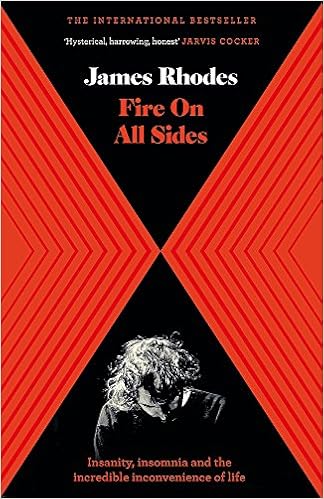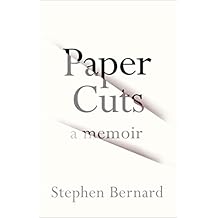

Fire on All Sides by James Rhodes and Paper Cuts by Stephen Bernard review – surviving child rape
Two books by men who were sexually abused as children are unblinking in their accounts of violation and a lifetime’s psychological aftermath
Wherever you read these books will end up feeling incongruous. There’s an uncomfortable dissonance in reading about some of the most harrowing things men can do to children, and the psychological turmoil that unleashes, while on the bus, or waiting for coffee. But neither title sets out to be comfortable.
Paper Cuts, written in only six weeks, is a memoir by Stephen Bernard, a visiting professor of English at Oxford. His book details the persistent sexual abuse he suffered as a child at the hands of a Canon DT Fogarty. James Rhodes is the concert pianist whose first book, Instrumental, became the subject of probably the most high-profile publishing legal battle in the UK since the Da Vinci Codecopyright case, after Rhodes’s ex-wife tried to ban the book, fearing its contents could upset their son. Rhodes won, and the book, which told of being raped by his school gym master, Peter Lee, and how classical music became his saviour, was a bestseller. The follow-up, Fire on All Sides (the title is from a stage direction in Don Giovanni), is a narrative of mental illness and relationship breakdown while Rhodes tours the world.
Bernard is keen to point out he is not a writer, but an academic. He has written books before, of course, but his specialist subjects are Dryden, Swift and Pope, rather than baring his soul. (In fact, Bernard says that Dryden, Swift and Pope are three people he “measures himself against”, which is not setting the bar low.) The language in Paper Cuts is spare but often the blank space does the work. Vortices of feelings are neatly summed up in simple clear sentences, the kind that I’d love to find and be able to deliver to a therapist tugging at some emotional thread. “Today I construct the self. Each day I construct the self,” Bernard admits on the first page. Over the course of the book he shows us how and why he must do this.
It is an extraordinary book in its unblinking truthfulness, even more so in its refusal to deny the complexities and ambiguity that follow such childhood trauma. This vivisection is just what we need in the discussion and literature of mental illness and its sources. However we might blanch.
Bernard writes: “Fogarty was ‘in’ me in a physical sense, but also ‘in’ me in a psychological sense. There was something full and all-invasive to his violation of me which it is almost impossible not to admire.” That admireis not an easy word to read. Nor is a paragraph on what makes a “good rape”. But with these passages, which reveal both a darkly humorous coping mechanism and an unapologetic forensic analysis of the act itself, Bernard obliges the reader to consider how a rape is, how a rape victim is, how a rapist is. Rape, Bernard writes, is a “war won by inches” and he doesn’t spare us those inches, nor does he spare us the contradictions and complications of the postbellum battles.
If there is a flaw in Paper Cuts it is the strange underlying structure that is Bernard filing a piece for the Times Literary Supplement. The narrative of his childhood is interspersed with a real-time rush to finish the present-day article. “I must crack on!” he’ll interject, as he moves between the Bodleian reading rooms and cafes, “this isn’t getting done!” Perhaps because I am a journalist I found this stressing over word count an irrelevant distraction. (Perhaps Bernard needed these breathers to have the strength to cover the other content, and, to be generous, it shows how the quotidian can be made difficult when the past looms so large in the present.)
The most fascinating part of his story is Bernard’s treatment with ketamine. Ketamine has long been used as an experimental treatment for otherwise resistant depression, and his detailing of injections at the Warneford hospital in Oxford for the depression element of his bipolar disorder (where I also was a patient for my own bipolar disorder) is both enlightening and amusing (he had hallucinations of Margaret Thatcher, for instance, as if he didn’t have enough to deal with).
Bernard is a man of exceptional intelligence and achievement who has been blinded to those qualities by the fact that, as he puts it, a “good rape” gets into one’s head as well as other places.
This same recurring low self-esteem is true of Rhodes. Despite receiving cross-continental acclaim and applause, he often calls himself the worst names under the sun and feels suicidal. The touring journal of a musician wouldn’t be my first choice of genre, but Rhodes has once again written a highly readable book. Fire on All Sides covers his childhood experiences and his struggle to form meaningful relationships as an adult amid the cacophony of his brain. It is also part travelogue and a sort of introduction to classical music: I learned that Beethoven fathered 20 children and read about one of Rhodes’s heroes, the Canadian pianist Glenn Gould.
Rhodes and Bernard are explicit about penetration. Nobody truly understands the horror film if hiding behind a cushion
Disclaimer: I know Rhodes a little. I know the favourite practice suite he mentions at the Steinway showroom because I met him there once to have coffee afterwards. We have spoken of the many medications he lists in this book, and while others might find his almost 100-page obsession with a parking fine ridiculous, I absolutely get it. With searing honesty, Rhodes lays the parts of himself out like the clothes he packs before a trip abroad. He gives us examples of horrible behaviour to girlfriends, of his paranoia, even the sort of sex he likes. He is twice divorced and dates often. Bernard, by contrast, has shied away from all adult relationships, sharing a kiss just the once. These disparate experiences give an insight into how the pegs on which mental health professionals hang their diagnoses are not made of stone.
Psychiatry is too big a subject for both books (and this review) to tackle in greater detail, but a case can be made that it is an art as much as a science (though the science part is very, very important). It is also a minefield and one that shifts beneath the feet. Rhodes would need two more hands to count the diagnostic labels others have attached to him. Bernard writes that “my illness has been made manifest, has manifested itself in a fact”, which is a good description of what it’s like to be diagnosed, even if that “fact” can become fluid over time. Both men’s therapists have cameos. Bernard’s therapist is good and supportive (unlike his first, a stooge paid for by his abuser). One of Rhodes’s is truly awful and seems to be more interested in using him as a cash cow.
Fire on All Sides, against the odds, is very funny, not least in each chapter preface, where Rhodes takes a happy-clappy Instagram-worthy quote and “translates” it. Example: “I don’t need to find my other half. I am perfectly whole and complete just as I am. A strong lovable human being.” Rhodes’s translation: “You colossal dickhead. You haven’t got a fucking clue about love and relationships. You’re going to die alone and even your cats will run into oncoming to get away from you.” The translations get less acerbic as Rhodes’s mood lifts. Which is a shame, because even when well I find the sort of quotes he lampoons unbearable.
A friend asked me recently whether I believed in writing as exorcism, whether writing, as I sometimes do, about mental illness and trauma helped me. The pious (but also) true answer was that I hoped it helped others, but that it must, too, in some way be self-beneficial. And it is important. Bernard and Rhodes are explicit about the physics of a grown man penetrating a small boy and what that means. For life. Physically, mentally: the entire bloody mess of it. But this is how it should be, because nobody truly understands the horror film if they’re hiding behind a cushion. Hiding is antithetical to understanding, to learning. And many people, Rhodes writes, were inspired to seek help for themselves and retribution for their abusers after reading his first book, Instrumental. I would say, however, that though the Daily Mail’s favourite obsession, “trigger warnings” over potentially disturbing content, have gone too far, these books are a perfect example of where they are good practice. As are the helpline numbers at the back of Paper Cuts.
I am left with a sense that both of these men were helped in some way by art, music and literature. Bernard professes “not to rate literature”, though he has made a successful career in it and has the best private library, he thinks, in Oxford. He has a wonderful habit of reading, every single day, a newspaper from history. Rhodes is in love with music and involved with an effort to transform creativity in all forms for children in schools – the oversight of which is appalling, and will not improve as long as government cuts extend and parents are asked to shell out even for stationery.
I believe people can be saved by art, literature and music. But people are also saved by people. Both men speak fondly of support networks. But two men in positions of authority, a clergyman and a prep-school teacher; two adults meant to play their parts in nurturing these kids (because it takes a village) instead burst them open and cast their identities to the wind.
Rhodes makes the point that it isn’t even illegal in the UK to witness child abuse and not report it. That must change. If altering the law is the legacy of these books by two exceptional men, it will be fitting. The achievement and character, the humanity, of Stephen Bernard and James Rhodes exposes Canon Fogarty and Peter Lee as something Other. Embarrassment stalks those of us who have suffered, but it is Fogarty and Lee who should be buried in shame.
No comments:
Post a Comment